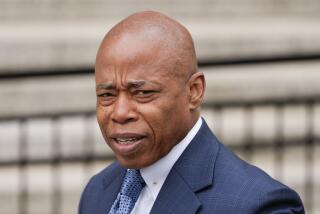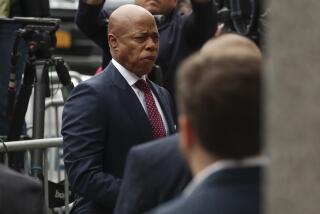Second investigation opens into mayor’s free tickets
A second investigative agency confirmed Tuesday that it has begun looking into Los Angeles Mayor Antonio Villaraigosa’s practice of accepting thousands of dollars in free tickets, and the mayor found himself again being pressed by reporters at events meant to draw attention to other issues.
David Demerjian, head deputy of Los Angeles Dist. Atty. Steve Cooley’s Public Integrity Division, said he had contacted the City Ethics Commission — which is conducting its own investigation of the tickets — after receiving a complaint that mentioned articles about the practice by the Los Angeles Times and by KTTV-TV Channel 11.
As part of the inquiry, Demerjian said, prosecutors will try to determine whether Villaraigosa should have disclosed to the commission that he received the tickets.
“Obviously, the issue is whether the mayor received gifts which he failed to report,” said Demerjian, who added: “At this point, I cannot say whether or not a crime has occurred.”
The issue has dogged the mayor since news reports began to surface four weeks ago.
On Tuesday, as reporters followed him from a news conference devoted to environmental technology to a summit for entertainment industry executives, Villaraigosa faced new questions about his decision to accept tickets to as many as 80 sporting events, awards shows and concerts over the last five years — and why his office has so few records to document his attendance.
State and city laws require politicians to report gifts worth of more than $50 and to say who gave them. State law prohibits them from accepting more than $420 in gifts from any one source in a year.
Villaraigosa has acknowledged receiving free tickets but has staunchly defended his actions by arguing that, under state law, elected officials do not have to declare tickets as “gifts” if the official is conducting public business or has a ceremonial role at the event.
Villaraigosa contends that he was promoting and representing Los Angeles when he attended the events. On at least some of those occasions, he presented decorative city proclamations to athletes, entertainers or organizers.
“We stand by the position that we were acting in our official capacity,” he told reporters as he walked out of City Hall on Tuesday.
The Times reported two weeks ago that the mayor’s lawyer, Brian Currey, had not found records that spelled out who paid for the mayor’s tickets. So far, Villaraigosa’s office has confirmed that he paid for a single event — a U2 concert at the Rose Bowl in Pasadena.
Currey said that because the events are exempt from the state’s reporting requirements, there was no need for Villaraigosa to keep a log showing who the contributors were. “My understanding is that in many instances, the mayor does not know exactly who the donors of the tickets were,” he added.
A spokesman for Anschutz Entertainment Group told The Times last month that Villaraigosa has watched games at the company’s luxury suite at Staples Center on occasions when he performed official city business. On Tuesday, Michael Roth, AEG’s vice president of communications, said the mayor also sat in the company’s suite at the Nokia Theatre, which AEG also owns.
“I am not aware that we have provided tickets in any location other than our suite for the mayor’s use,” said Roth.
The mayor’s practices stand in contrast to his predecessor, former Mayor James Hahn, who publicly reported tickets he received to similar sporting events and award shows, including the Academy Awards, Dodgers and Angels games and a UCLA- USC football game. Billionaire New York Mayor Michael R. Bloomberg pays his own way to entertainment and sporting events, including Yankees games.
Villaraigosa’s official calendar listed more than a dozen concerts since 2005, including performances by Beyoncé, Shakira and Mary J. Blige. Currey said Villaraigosa’s staff informed him that the concert tickets were provided by the concert promoter, the artist or the venue.
In the case of athletic events, Currey said the mayor’s staff told him the tickets were paid for by various sources, including friends, the team or the owner of a stadium, such as Anschutz Entertainment Group. In the dozen instances when he attended Dodgers games, he sat in the box of the team’s owners, Frank and Jamie McCourt.
“None of those [games] qualified as reportable gifts,” Currey added.
That argument drew criticism from Walter Moore, who ran against Villaraigosa unsuccessfully in 2009 and filed a complaint with the Ethics Commission about his practice of accepting free entry to various events. Moore contends that city law sets a higher standard than the state, barring elected officials from receiving gifts of more than $100 from companies with business pending at City Hall.
Both the Los Angeles Dodgers and AEG have had business before the city on issues ranging from shuttle buses to tax breaks. “Complying with the state law is not the same as complying with the local law,” Moore said.
The Ethics Commission opened an investigation into Villaraigosa’s tickets earlier this month, sending the mayor a letter on June 2 asking for a series of records. Officials with that agency would not say whether the city’s law takes precedence over the state’s gift regulations.
“Any time that there is an intersection between state and city law, we would recommend that someone request advice from us,” said Ethics Commission spokeswoman Jennifer Bravo. “No one has requested formal written advice about this topic.”
More to Read
Sign up for Essential California
The most important California stories and recommendations in your inbox every morning.
You may occasionally receive promotional content from the Los Angeles Times.











